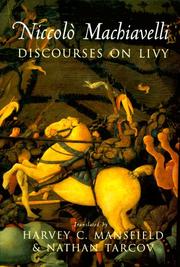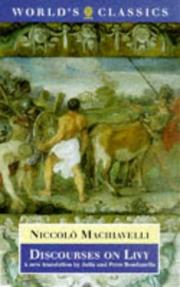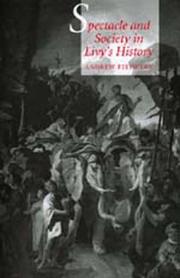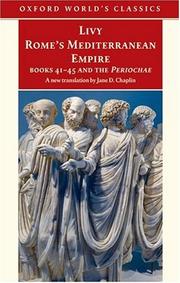| Listing 1 - 10 of 15 | << page >> |
Sort by
|
Book
Year: 2010 Publisher: São Paulo, Brazil : Editora UNESP,
Abstract | Keywords | Export | Availability | Bookmark
 Loading...
Loading...Choose an application
- Reference Manager
- EndNote
- RefWorks (Direct export to RefWorks)
This book deals with the representations of Tito Lívio, Roman historian of the end of the first century BC, about the Senate of Rome. Representations as symbolic references, values, beliefs and worldviews of historically positioned individuals are commonly designed in texts and cultural artifacts that are intended to assist in the establishment of consensus and norms of conduct in a given society. In this sense, the book focuses on the opinions of the Roman author, inscribed in his Ab Urbe Condita Libri (Since the Beginning of the City), on the most influential institution in the Republic, the one that most needed to adapt to the new political situation of the Principality, at the time in which power was centralized by Otávio Augusto, first Princeps- Roman Emperor, great-nephew and adopted son of Julius Caesar.
Livy. --- Rome --- History. --- Politics and government.

ISBN: 0226500357 Year: 1996 Publisher: Chicago (Ill.): University of Chicago press
Abstract | Keywords | Export | Availability | Bookmark
 Loading...
Loading...Choose an application
- Reference Manager
- EndNote
- RefWorks (Direct export to RefWorks)
Political science --- Early works to 1800 --- Livy. --- Rome --- Historiography.
Book
ISSN: 16104188 ISBN: 9783406621888 3406621880 3406621899 2821846347 Year: 2011 Volume: Heft 140 Publisher: München Beck
Abstract | Keywords | Export | Availability | Bookmark
 Loading...
Loading...Choose an application
- Reference Manager
- EndNote
- RefWorks (Direct export to RefWorks)
Hauptbeschreibung Das Ziel dieser Arbeit ist ein besseres Verständnis der Kommunikation zwischen Livius und seinen Lesern über Geschichte und die Analyse der vor diesem Hintergrund zu beobachtenden literarischen Techniken. Zu diesem Zweck wird der Text hier programmatisch in seiner Gesamtheit in den Blick genommen und bei seiner Interpretation stets die Perspektive des Rezipienten einbezogen. In einem ersten Schritt wird ab urbe condita zunächst in den politischen und kulturellen Kontext seiner Entstehungszeit im 1. Jh. v. Chr. eingeordnet, die durch einen vielfachen Wandel, nicht z
Narration (Rhetoric) --- Narration --- History --- Histoire --- Livy. --- Livy --- Criticism, Textual. --- Technique. --- Technique --- Livy -- Technique. --- Livy. -- Ab urbe condita. --- Narration (Rhetoric). --- Narration. --- Languages & Literatures --- Greek & Latin Languages & Literatures --- Narrative (Rhetoric) --- Narrative writing --- Tite-Live --- Livio --- Livius, Titus --- Livius Patavinus, Titus --- Livius --- Titus Livius --- Rhetoric --- Discourse analysis, Narrative --- Narratees (Rhetoric) --- Livius, T. --- Tite-Live, --- --Histoire romaine --- --Narration --- --Livy --- Livyus, Titus --- Liviĭ, Tit --- Liwiusz, Tytus --- Livio, Tito --- ליוויוס, טיטוס --- Livy - Ab urbe condita --- Livy - Technique --- Tite-Live, 64 av JC-10 --- Erzählweise --- Ab urbe condita
Book
ISBN: 9791036555862 Year: 2020 Publisher: München C.H.Beck
Abstract | Keywords | Export | Availability | Bookmark
 Loading...
Loading...Choose an application
- Reference Manager
- EndNote
- RefWorks (Direct export to RefWorks)
Uncertainty is a fundamental part of the human condition. Experiences thwart expectations, and the world is in constant need of interpretation, evaluation and disambiguation. When writing about the past, historians can approach this uncertainty in different ways and either eliminate it from their history or enact it. This book examines the dynamics between historiography and uncertainty in the works of Livy and Velleius Paterculus. Combining close readings and theoretical reflection, it develops a distinct concept of temporal and hermeneutic uncertainty and builds on this concept to shed new light on the narrative composition of their histories. It has been argued that narrative is an essential part of human life and civilization. While engaging with recent approaches to the theory of narrative, Uncertainty in Livy and Velleius explores historiographical narrative as a mode of grappling with uncertainty. Unsicherheit ist Teil der conditio humana. Erfahrungen durchkreuzen Erwartungen, und die Lebenswelt verlangt nach Interpretation, Einordnung und der Auflösung von Mehrdeutigkeiten. Historiker können diese Unsicherheit in ihren Geschichtsbildern entweder abbilden oder eliminieren. Dieses Buch untersucht das Verhältnis zwischen Geschichtsschreibung und Unsicherheit in den Werken der römischen Historiker Livius und Velleius Paterculus. Methodisch kombiniert es literaturwissenschaftliche Analysen und theoretische Reflexion, um ein klar umrissenes Konzept von Unsicherheit zu entwickeln, das zwischen einer zeitlichen und einer hermeneutischen Dimension unterscheidet. Mit Hilfe dieses Konzepts können bisher vernachlässigte Aspekte der narrativen Form der beiden Geschichtswerke in den Blick genommen werden. Das Erzählen gilt als essentieller Teil menschlichen Zusammenlebens. In Auseinandersetzung mit aktuellen Debatten zur Erzähltheorie versteht Uncertainty in Livy and Velleius historiographisches Erzählen als eine Auseinandersetzung mit Unsicherheit.
History --- Literature (General) --- historiography --- classical philology --- temporal uncertainty --- hermeneutic uncertainty --- narrative composition --- Livy --- Velleius

ISBN: 0191587397 0585110662 9780191587399 9780585110660 0192829459 9780192829450 0192804731 9780192804730 0191604666 0199555559 Year: 2003 Publisher: Oxford Oxford university press
Abstract | Keywords | Export | Availability | Bookmark
 Loading...
Loading...Choose an application
- Reference Manager
- EndNote
- RefWorks (Direct export to RefWorks)
Political science --- Political Theory of the State --- Political Science --- Law, Politics & Government --- Early works to 1800 --- Livy.

ISBN: 0520210263 0520210271 0520919696 0585160287 9780520919693 9780585160283 9780520210271 9780520210264 Year: 1998 Publisher: Berkeley, Calif : University of California Press,
Abstract | Keywords | Export | Availability | Bookmark
 Loading...
Loading...Choose an application
- Reference Manager
- EndNote
- RefWorks (Direct export to RefWorks)
Public spectacle-from the morning rituals of the Roman noble to triumphs and the shows of the Arena-formed a crucial component of the language of power in ancient Rome. The historian Livy (c. 60 B.C.E.-17 C.E.), who provides our fullest description of Rome's early history, presents his account of the growth of the Roman state itself as something to be seen-a visual monument and public spectacle. Through analysis of several episodes in Livy's History, Andrew Feldherr demonstrates the ways in which Livy uses specific visual imagery to make the reader not only an observer of certain key events in Roman history but also a participant in those events. This innovative study incorporates recent literary and cultural theory with detailed historical analysis to put an ancient text into dialogue with contemporary discussions of visual culture.In Spectacle and Society in Livy's History, Feldherr shows how Livy uses the literary representation of spectacles from the Roman past to construct a new sense of civic identity among his readers. He offers a new way of understanding how Livy's technique addressed the political and cultural needs of Roman citizens in Livy's day. In addition to renewing our understanding of Livy through modern scholarship, Feldherr provides a new assessment of the historian's aims and methods by asking what it means for the historian to make readers spectators of history.
Italy --- Regions & Countries - Europe --- History & Archaeology --- Livy --- Rome --- History --- Historiography --- Amusements --- Spectacles et divertissements --- Social aspects --- Aspect social --- Livy. --- Criticism and interpretation. --- History. --- Historiography. --- Histoire --- Historiographie --- Criticism and interpretation --- Livius Patavinus, Titus --- Livius --- Tite-Live --- Livio --- Titus Livius --- Livius, Titus --- Livius, T. --- Livyus, Titus --- Liviĭ, Tit --- Liwiusz, Tytus --- Livio, Tito --- ליוויוס, טיטוס --- Livy - Ab urbe condita --- Rome - History --- Rome - Historiography
Book
ISBN: 0198144423 9780198144427 Year: 1973 Publisher: Oxford Clarendon
Abstract | Keywords | Export | Availability | Bookmark
 Loading...
Loading...Choose an application
- Reference Manager
- EndNote
- RefWorks (Direct export to RefWorks)
Livy --- Livy. --- Rome --- History --- Historiography. --- Histoire --- Historiographie --- Historiography --- 871 LIVIUS, TITUS --- Latijnse literatuur--LIVIUS, TITUS --- Tite-Live --- Livius, Titus --- Livyus, Titus --- Liviĭ, Tit --- Liwiusz, Tytus --- Livio, Tito --- Livius, T. --- Livio --- ליוויוס, טיטוס --- -Historiography. --- 871 LIVIUS, TITUS Latijnse literatuur--LIVIUS, TITUS --- Livius Patavinus, Titus --- Livius --- Titus Livius --- Rim --- Roman Empire --- Roman Republic (510-30 B.C.) --- Romi (Empire) --- Byzantine Empire --- Rome (Italy) --- Livy - Ab urbe condita - Liber 31-33 --- Rome - History - Republic, 265-30 B.C. - Historiography

ISBN: 0191828505 1281147001 9786611147006 1435699025 0191517844 9780191517846 9781435699021 9780191828508 6611147004 0192833405 9780192833402 9781281147004 0199556024 Year: 2007 Publisher: Oxford New York Oxford University Press
Abstract | Keywords | Export | Availability | Bookmark
 Loading...
Loading...Choose an application
- Reference Manager
- EndNote
- RefWorks (Direct export to RefWorks)
The Third Macedonian War ended the kingdom created by Philip II and Alexander the Great and was a crucial step in Rome's dominance of the Mediterranean. Livy's narrative is also a moral study of the individuals involved. This edition includes the Periochae, later summaries of Livy's original 142-book history.
Livy --- Livius, Titus --- Livius Patavinus, Titus --- Tite-Live --- Livyus, Titus --- Liviĭ, Tit --- Liwiusz, Tytus --- Livio, Tito --- Livius, T. --- Livio --- ליוויוס, טיטוס --- Rome --- History. --- Titus Livius

ISBN: 1280444797 1423767683 9781423767688 9781280444791 0198152744 9780198152743 0198152744 138300644X Year: 2000 Publisher: Oxford New York Oxford University Press
Abstract | Keywords | Export | Availability | Bookmark
 Loading...
Loading...Choose an application
- Reference Manager
- EndNote
- RefWorks (Direct export to RefWorks)
The Roman historian Livy saw the past as a storehouse of lessons. This text examines how his historical figures manipulate the shifting meaning of the past and reveals Livy's acute sensitivity to contemporary problems.
Italy --- Regions & Countries - Europe --- History & Archaeology --- Livy. --- Livy --- Livius, Titus --- Livius Patavinus, Titus --- Tite-Live --- Livyus, Titus --- Liviĭ, Tit --- Liwiusz, Tytus --- Livio, Tito --- Livius, T. --- Livio --- ליוויוס, טיטוס --- Criticism and interpretation. --- Rome --- History. --- Historiography. --- Titus Livius --- Criticism and interpretation --- Historiography --- History

ISBN: 9060324420 9027272662 1283903180 9789060324424 9789027272669 Year: 1971 Publisher: Amsterdam Grüner
Abstract | Keywords | Export | Availability | Bookmark
 Loading...
Loading...Choose an application
- Reference Manager
- EndNote
- RefWorks (Direct export to RefWorks)
Die Corvinuserzählung, die wir bei Gellius finden, ist in der Forschung lange disputiert worden. H. Peter (1870) hatte sich entschlossen, sie unter die Fragmente des Claudius Quadrigarius aufzunehmen, wegen der Nachbarschaft zur Torquatuserzählung. Mcdonald (1975) vergleicht die bei Gellius gegebene Erzählung mit der livianischen (VII 26f) und betrachtet sie dabei als repräsentativ für die Vorlagen des Livius. Die Gleichheit des Gegenstandes verhilft uns dazu, den Unterschied, der sich in verschiedener Sprache anzeigt, im Dargestellten bestätigt zu finden. Als eine Vergleichung, die dem Wesen
Latin prose literature --- History and criticism --- Gellius, Aulus --- Claudius Quadrigarius, --- Criticism and interpretation --- Rome --- Historiography --- In literature --- -Latin literature --- Claudius Quadrigarius, Quintus --- -Gellius, Aulus --- Quadrigarius, Quintus Claudius --- Claudio Quadrigario, Q. --- Quadreigario, Q. Claudio --- Aulu-Gelle --- Gelio, Aulo --- Gelius, Aulius --- Historiography. --- In literature. --- -History and criticism --- Livy --- Livy. --- Gellius, Aulus. --- Criticism and interpretation. --- History and criticism. --- Latin prose literature - History and criticism --- Claudius Quadrigarius, - Criticism and interpretation --- Rome - Historiography --- Rome - In literature
| Listing 1 - 10 of 15 | << page >> |
Sort by
|

 Search
Search Feedback
Feedback About UniCat
About UniCat  Help
Help News
News